Parents
Why Babies Like Our Lab
We hope you and your infant will enjoy participating in our research studies. We design our studies to attract babies’ attention, such as seeing videos of people talking in infant-directed speech (the sing-song voice most adults use when talking to babies). Most of our current studies use an eye-tracking system to measure exactly where your baby looks at the pictures or videos on the screen, such as at the eyes or mouth of a talking face. Parents find it interesting to see where their babies were looking during our experiments.
In choosing to participate, you will be joining many other families who are helping researchers learn more about young infants’ perception of speech and faces as well as the development of other cognitive abilities. Each time that you participate, you will receive a certificate to show our appreciation as well as information on infant development. We hope that you will help us learn more about babies’ early abilities!
Parents are encouraged to contact us at any time within their child’s first year of life to inquire about our active studies.
Email: infantlearningproject@utdallas.edu
Phone: 972-883-3649
Please fill out this interest form.
Picture Tour of the Lab
The Entrance
When Parents arrive at the Callier Center, they will be met at the entrance by an undergraduate student to receive a visitor parking pass before coming to the lab.
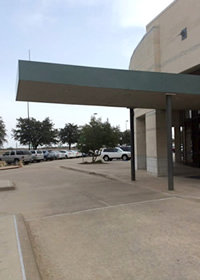
The Waiting Room
When parents and children arrive at the lab, children can play in our play area while parents complete a few required forms.
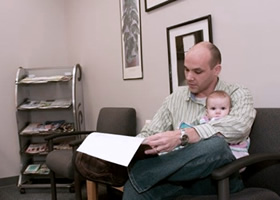
The Play Area
Older siblings are welcome to come to the lab as well! Please let us know ahead of time so we can arrange for a lab student to stay with older children while parents and babies participate in the study.
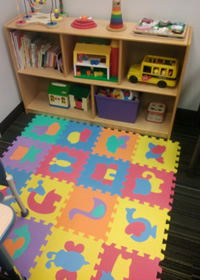
The Study
Parents and babies will sit together to view our stimuli. The videos and audio clips that we display typically last only 2-3 minutes, although there will be a brief period at the start of the study during which we must set up the equipment.
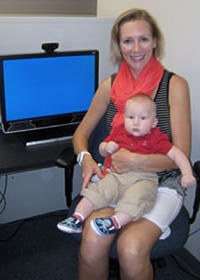
Viewing the Results
After babies have completed viewing all of our stimuli, we can show you your baby’s results.
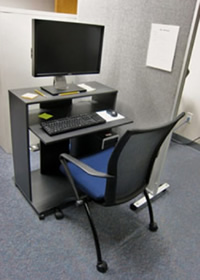
Although our studies do not allow us to screen for delays or identify specific individual skills, when the results of many babies are taken together our lab can identify common aspects of infant development. By participating in our studies, you can help us learn more about how babies learn and grow!
Resources
Website Resources
The UT Dallas Center for Children and Families provides a variety of services and resources to parents who are interested in or have concerns regarding their child’s development.
Zero to Three is a national organization that supports early childhood development and provides information to parents.
Sponsored by the Centers for Disease Control and Prevention, this site has developmental milestones, fact sheets, and information on developmental disorders.
Information on the Children’s Defense Fund, along with other information on meeting children’s needs.
The Public Broadcasting Service’s (PBS) The Whole Child site provides information to parents and educators, along with the ABC’s of child development.
The site for the Association for Psychological Science provides a broad picture of psychology.
The American Psychological Association’s site provides information into all areas of psychology including information for children and families.
The Kid’s Health site has information about auto safety, incuding how to choose and install car seats.
The National Highway Traffic Safety Administration has information on how to keep your child safe in the car, with instructional videos on how to install safety seats.
This site, called Anchor It!, is a government site with information on how to anchor furniture to prevent tip-overs and injuries.
Additional Research Opportunities for Children and Families
Social Cognition and Interaction in Autism Lab — Dr. Noah Sasson
Developmental Neurolinguistics Laboratory — Dr. Mandy Maguire
Family Research Lab — Dr. Jackie Nelson
Healthy Development Project — Dr. Shayla Holub
